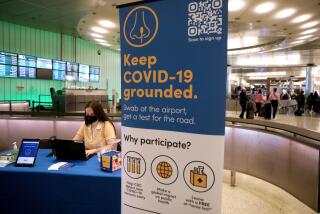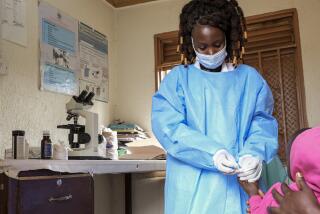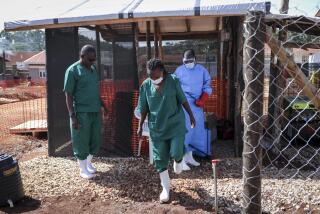With Ebola, it’s better to screen outbound flights, study suggests
- Share via
The deceased Liberian Thomas Eric Duncan is unlikely to be the last person to carry the Ebola virus out of one of three West African countries, a new study suggests. Given current infection rates in Liberia, Sierra Leone and Guinea, a team of Canadian infectious disease specialists estimates that as many as three passengers a month are likely to board international flights from one of the three countries.
But the research concludes that screening air travelers in a bid to block the virus’ export would be far more effective if conducted in airports inside the three stricken countries than screening done in arrival destinations such as the United States.
The analysis, published online in the Lancet on Monday, suggests that on average every 10.5 days, a single person sick with Ebola is likely to carry the virus by air from Liberia, Sierra Leone or Guinea to another country.
Even at currently reduced levels of outgoing air traffic, the report says, an air traveler carrying the Ebola virus can be expected to leave Liberia once every 12 days. Given the prevalence of infection and rates of international travel, a single infected air passenger from Sierra Leone could be expected to travel to another country by air once every 17 weeks.
While Guinea is the most populous of the countries, its relatively low rate of infection and of international travel make it the least likely of the three countries to export the Ebola virus by air, the research found. A single Ebola-infected passenger could be expected to cross national borders once every eight months, the group estimated.
International air travelers at risk of Ebola must set off from one of only three airports, and flights originating in the three countries set down at just 15 airports internationally. U.S. international airports are among the 1,238 airports across the world to receive travelers indirectly from Liberia, Sierra Leone and Guinea.
For public health officials pondering the best way to stop passengers who could export the Ebola virus, that pattern of international travel tilts the screening calculation vastly in favor of doing so at airports in Liberia, Sierra Leone and Guinea.
Each and every international airline passenger screened at one of those airports could carry the deadly virus, the authors of the Lancet analysis assumed. But at airports throughout the United States - and others that welcome no direct flights from the three African countries - thermometer-wielding personnel would have to screen 2,512 passengers in order to find one passenger who may have been exposed to Ebola.
The study suggests that countries least able to manage the arrival of Ebola are also most likely to receive infected passengers. Of those expected to travel internationally from the three West African countries affected by Ebola in 2014, more than 60% are likely to have final destinations in low- or lower-middle-income countries such as Ghana and Senegal.
Moreover, says study coauthor Dr. Isaac I. Bogoch, screening passengers for Ebola symptoms such as fever will likely miss about 90% of those infected, since the virus’ incubation period - the time it takes to develop Ebola disease after exposure to the virus - is widely thought to be about 10 days. For as many as nine days (in some cases, more), an infected person would likely show no signs of fever, limiting the value of thermal screening.
“It’s a small layer of protection,” said Bogoch, a specialist in infectious and tropical diseases at Toronto General Hospital and a professor of medicine at University of Toronto. “It’s something we can do, but it’s not the only thing we can do” to stop the spread of Ebola, he added.
Canadians learned the hard way that when seeking to block the international spread of a deadly pathogen, airport screening of international arrivals is little more than window dressing.
In early 2003, after international travelers brought the virus that caused Severe Acute Respiratory Syndrome, or SARS, to Canada, the country instituted screening of inbound and outbound travelers in all of its international airports.
The net from some 6.5 million screening transactions undertaken over about six months: 9,100 passengers referred for further assessment, and no cases of SARS. A pilot project that thermally scanned 2.4 million passengers sent 832 for further assessment, but, again, found no cases of SARS.
But Bogoch has a message for those who read the calculations and conclude they point to the need to ban in and out of the three affected West African countries: Think again.
The factor that overwhelmingly drives expected virus-export rates, Bogoch said, is the prevalence of infection in the countries involved. Where it is lower - as it is in Guinea - the probability of a traveler bringing it to another country is relatively low. Where it is rampant - as in Liberia, where close to 40 people per 100,000 have the virus - export probability is high.
By adopting policies that further isolate the three affected countries and prevent the movement of trade, people and supplies, Bogoch says, “we might create a situation that worsens disease transmission” in Liberia, Sierra Leone and Guinea. And if transmission rates are driven up in West Africa, the virus will eventually spill over its borders in Africa and arrive - on foot, by boat and eventually by airplane - “on our doorstep,” he warned.
In a world as interconnected as ours, isolationist policies might provide limited, short-term protection from Ebola, Bogach said. But, he added, “the vast majority of effort should be concentrated on reducing disease transmission in West Africa. When we do that, we reduce the risk of transporting the virus locally and internationally.”
In a linked comment published by the Lancet, two Chinese physicians suggested that entry screening may be of some value, given that the three West African countries are unlikely to have the resources to expand their screening of outgoing passengers.
“In addition to any entry or exit screening, vigilance within countries is essential for early detection of imported cases of Ebola virus disease,” wrote Dr. Hongjie Yu of the Chinese Center for Disease Control and Prevention and Dr. Benjamin Cowling of the University of Hong Kong.
@LATMelissaHealy







